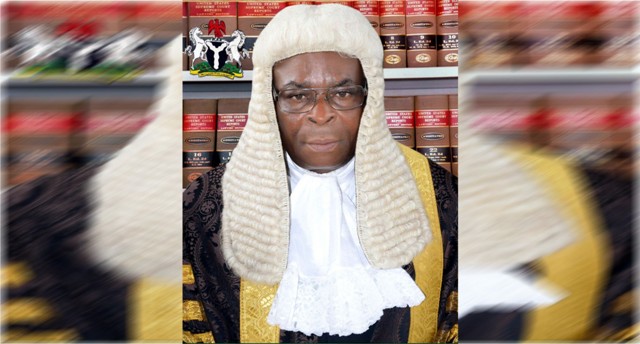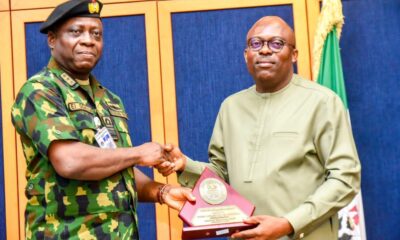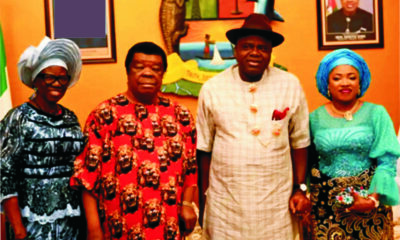Politics
CJN’s Non-Asset Declaration: The Frills, Thrills And Implications

The ongoing matter regarding the trial of the Chief Justice of Nigeria (CJN), Walter Samuel Nkanu Onnoghen, over non-declaration of assets has become one of the most controversial developments to dominate the country’s political space ahead of the 2019 general elections scheduled to hold in February.
The crux of the matter is that a civil society group, Anti-Corruption and Research-Based Data Initiative (ARDI), on the 7th of January 2019, petitioned against the CJN to the Code of Conduct Bureau (CCB) and the Economic and Financial Crimes Commission (EFCC) over his non-compliance to the Nigerian constitution regarding declaration of assets.
The petition reads in parts: “We hereby petition you on suspected violations of the law and the Constitution of Nigeria by the Chief Justice of Nigeria, the Honourable, Justice Walter Samuel Nkanu Onnoghen.
“Specifically, we petition you based on the alarming facts detailed below, all of which indicate that the leader of our country’s judicial branch is embroiled in suspected official corruption, financial crimes and breaches of the Code of Conduct Bureau and Tribunal Act”.
The organisation alleged that Justice Onnoghen made five different cash deposits in dollars into an identified Standard Chartered Bank Account, which was not declared to the CCB as part of his assets, being a requirement for a public office holder, especially of his status.
Following this, on Thursday, January 10, 2019, the Federal Government filed charges against Justice Onnoghen, accusing him of false declaration of assets.
The Federal Government said, against the provisions of the law, the Chief Justice only partially declared his assets in 2016 after the controversial crackdown on judges.
The government further said that the number one judge of the nation still failed to declare a series of bank accounts, denominated in local and foreign currencies, linked to him at a Standard Chartered Bank branch in Abuja.
In his response to the CCB upon receiving the query, the CJN said he forgot to update his asset declaration, after the expiration of his 2005 declaration.
In his words: “My asset declaration form numbers SCN 00014 and SCN 00005 were declared on the same day, 14/12/2016 because I forgot to make a declaration of my assets after the expiration of my 2005 declaration in 2009. Following my appointment as acting CJN in November 2016, the need to declare my assets anew made me realise the mistake.
“I then did the declaration to cover the period in default. I did not include my Standard Charted Bank account in SCN 000014 because I believed they were not opened.
“I did not make a fresh declaration of asset after my substantive appointment as CJN because I was under the impression that my SCN 000015 was to cover that period of four years which includes my term as CJN.”
Meanwhile, the trial which was billed to commence last Monday, had two-key hick-ups: Onnoghen, who was represented by a team of 47 senior lawyers, led by Wole Olanipekun, was absent during the first sitting, and the defence, as presented by Olanipekun, was that the court has no power to hear the charges at all, because due constitutional procedure had not been followed.
The Nigerian Constitution required in Section 292 that a serving judge must first be investigated and indicted by the National Judicial Council (NJC) before dismissal or trial for misconduct in open courts. The NJC regulates the Nigerian judiciary.
Olanipekun also argued that the tribunal summons to Mr Onnoghen was delivered to his personal assistant and not him personally, arguing that this was an anomaly and added to the reasons for his absence.
While the prosecution, led by Umar Aliyu from the Federal Ministry of Justice, views this as a mere distraction, Danladi Umar, the tribunal chairman, adjourned further hearing until January 22. He ordered that Mr Onnoghen must appear to be docked for the charges against him, as well as listen to arguments on whether or not the tribunal could assert jurisdiction.
Expectedly, there have been so many interpretations attached to the first ever trial of the Chief Justice of Nigeria, cutting across interests ranging from political affiliations, through ethnic considerations to professional standpoints, and personal opinions.
Going back memory lane, pundits express the belief that Onnoghen’s present travail may have started from the point of his appointment. Upon the retirement of the former Chief Justice, Mahmud Mohammed, in 2016, at the statutory age of 70, Onnoghen’s appointment suffered unprecedented delay by President Mohammadu Buhari. But he was finally sworn in as Acting Chief Justice of Nigeria (CJN) on the 10th of November 2016.
There was however a prolonged delay in confirming him as the substantive Chief Justice, the position he rightly deserved as the most senior Justice of the Supreme Court.
The delay led to series of speculations from various quarters. Finally, on March 7, 2017, Onnoghen was sworn in as the 17th Chief Justice of Nigeria by Vice President Yemi Osinbajo, in his position as Acting President.
Amidst the cheers from mostly the ruling party, APC, and the holes picked by the opposition led by the PDP in the timing of the allegation and the manner of its execution, certain salient points remain very clear, and hence deserve to be treated cautiously and rightly, if the country must progress without avoidable political ranscour capable of destabilising the current fragile unity of purpose.
Following some body language of the Buhari-led government regarding the execution of the anti-corruption fight, as exemplified by the President’s refusal to assent the amended Electoral Act, close watchers of Nigeria’s political terrain have already indicated that the Federal Government is doing everything possible to gag any suspected decentering voice.
The question is, if the President’s excuse for not assenting to the Electoral Act was to avoid destabilising the electoral process, even when assent would mean less room for rigging, why would he allow the Onnoghen matter to be so pursued unconstitutionally in a hurry and with about a month to elections?
The answer seem, to be in what critics of the administration have adduced from the unfolding scenario: that Mr Buhari was behind the move to remove a Chief Judge of Southern origin in order to replace him with a judge from his northern region who would be more amenable to political influence.
In the words of Charles Omole, in a message to Premium Times, ”The timing of the indictment is suspicious. The speed with which it is being pursued strengthens the suspicion as it is uncharacteristic of the slow approach of this administration to act on even far more crucial matters in the past three years.”
The onus is thus on Mr President to prove otherwise: That his whole heightened drama over Onnoghen is not just for the February 2019 elections, even as non-declaration of asset is against the law. The only way to do this is to allow the law take its full course.
Soibi Max-Alalibo
Politics
How We Saved N2.3bn From LG Reforms – Diri
Bayelsa State Governor, Senator Douye Diri, has revealed that the reforms initiated and implemented by his administration led to the saving of the sum of N2.3 billion for the local government councils.
The governor disclosed this recently at the opening ceremony of an orientation programme organised for newly-elected local government council chairmen, vice chairmen, councilors and principal officers at Perdis Hotel, Akenfa.
Gov Diri stated that on assumption of office in 2020, some local government councils were highly indebted and unable to pay salaries but his administration took measures that resulted in regular payment of salaries, execution of projects and saving of funds.
The Bayelsa State Chief Executive restated his call on the Federal Government to create additional local councils in the state, saying it was injustice for some states to have more than 40 councils and receiving monthly allocation from the Federation Accounts Allocation Commission (FAAC), while the state had only eight.
He charged the newly elected local government officials to make good use of the two-day workshop to equip themselves with the requisite knowledge to carry out their responsibilities.
The governor also called on them to work as a team to ensure that development was felt at the grassroots.
“Local governments as at 2020 were unable to pay salaries, particularly Nembe, Ogbia, Ekeremor and Sagbama. There was some form of dissatisfaction in the system.
“After I went through the recommendations of the Deputy Governor, whom I entrusted with investigating the local government, I wasted no time in approving the recommendations.
“The recommendations included the ban on loans from any source by local government chairmen without approval of the governor; compulsory savings by every council; and the division of balance after payment of salaries into 60 and 40 per cent respectively. One part was for compulsory savings and the other to project implementation and immediate commencement of computerisation of their payroll as well as compulsory quarterly award of projects by each council chairman.
“We found a lot of fraud in the local government system. But as it stands today, our councils have N2.3billion as a result of the combination of the factors of reforms and proper supervision of that tier of government.
“The breakdown is N400million compulsory savings while N1.9 billion for capital projects. This is aside from the one done by caretaker committees in terms of project execution within the short period they stayed”, the governor said.
Gov Diri assured of his administration’s commitment to support the councils to achieve their goals and expressed confidence that the new officials would meet the expectations of the people.
“We firmly believe that good governance begins at the grassroots level. That is precisely why we have gathered here to equip you with the necessary skills and knowledge to improve our local government administration and enhance service delivery.
Ariwera Ibibo-Howells, Yenagoa
Politics
Monarch Cautions Against Divisive Politics, Declares Support For Fubara
The Eze Oruamara/Regent of Okwuzi Kingdom in Ogba/ Egbema/Ndoni Local Government Area of the State, Eze Victor Afaka, has sued for peace among the political class in the State.
Eze Afaka made the appeal while speaking with The Tide on the sidelines of the governorship victory thanksgiving service by the Ogba Egbema /Ndoni Chapter of the Simplified Movement in Omoku.
He said Governor Fubara should be allowed to display the vision that God has given to him to govern the state.
According to him, since every administration has its term and tenure, the man presently at the helm of affairs in Rivers State must be given the opportunity to complete his own term and tenure.
“I advise politicians to sheathe their sword and allow peace to reign. Politics and governance have their terms and tenure. When it is your tenure, you have your vision to display; when you conclude that vision God has given you as a leader of your community or of a state, you step aside and leave the next person to display the vision God has given to him” he said.
The traditional ruler said he and his people, including the youth, women and the Ogbakor Egbema, decided to attend the service because of the excellent vision of Governor Fubara
“We are happy, Okwuzi people are in full support of the government, the government of His Excellency, Sir Siminalayi Fubara”, he added.
He said that the governor’s peaceful disposition to governance has endeared him to His Kingdom, noting that Okwuzi kingdom was already a beneficiary of the present administration’s purposeful governance as the Omoku/Okwuzi road abandoned 10 years ago, was nearing completion.
“ONELGA, Okwuzi are benefitting from his government.The road that was abandoned for ten years is being completed right now and we know that there are so many other things he will do for us”, he said.
While urging the state government to give desired attention to the Okwuzi General Hospital that is in a state of dilapidation, Eze Afaka entreated Governor Fubara not to be distracted, but to continue to promote peace and development across the State.
John Bibor
Politics
APC Stakeholders Storm Secretariat, Demand Ganduje’s Resignation
A group of North Central stakeholders in the All Progressives Congress (APC) has stormed the national secretariat of the party in Abuja, demanding the resignation of the National Chairman, Dr Abdullahi Ganduje.
Addressing newsmen in Abuja yesterday, the protesters said their demand followed his recent suspension by a faction of his ward executives and the alleged bribery allegation levelled against him by the Kano State government.
While they chanted solidarity songs and displayed several banners some of which read, “Ganduje must resign” and “Return the APC chairmanship to North Central,” the protesters appealed to President Bola Tinubu and the Secretary to the Government of the Federation (SGF), George Akume, to consider returning the leadership of the party to the North Central.
Only on Tuesday, the Forum of APC State Chairmen had passed a vote of confidence on Ganduje, affirming their unalloyed support to him.
The protesters under the aegis of Concerned North Central APC Stakeholders lamented that the continued stay of Ganduje in office was a clear violation of the zoning principle in the party.
Mohammed Saba, who led the protesters, said unlike the 37 APC state chairmen, his people in the North Central have passed a vote of no confidence on the national chairman and equally demanded his immediate resignation.
Saba reiterated that the people of North Central felt betrayed when the position of APC national chairman was hijacked from them following the exit of Senator Abdullahi Adamu despite giving Tinubu the third highest votes after North West and South West at the 2023 presidential election.
He said, “We, the North Central APC Concerned Stakeholders, have resolved to unanimously agitate for our right and reclaim our mandate which was handed unto us by the National Convention of our great Party in 2022.
“Various sections of our constitution have established the procedure of replacing an executive member at all levels of the party in the event of death, resignation, incapacitation or expulsion from the party by any executive member.
“It is a fact that the emergence of Dr. Umar Ganduje as national chairman was done against the spirit and soul of the APC which is the constitution of our great party. This singular act has impacted negatively on us as a people in the North Central.
-
Opinion5 days ago
Agriculture: Solution To Hunger, Inflation, Food Insecurity
-
News5 days ago
Pan-Igbo Group Hails Dangote Group For Reducing Diesel Price
-

 Featured24 hours ago
Featured24 hours agoBe Firm In Fight Against Oil Theft, Fubara Tells CNS …As Navy Moves Training Hqtrs To Rivers …Seizes 14 Vessels In Three Months
-
Business23 hours ago
Diri Tasks NCDMB, SPDC On Projects Completion
-
Sports5 days ago
Minister Renews Hope For Sports Dev, Signs MoU
-

 Rivers5 days ago
Rivers5 days agoBayelsa LG Polls: BYSIEC Issues Return Certificates To Chairmen, Others
-
Politics23 hours ago
Fubara’ll Leave Rivers Better Than Expected – LG Boss
-
Sports23 hours ago
Eaglets Held In Pre-WAFU Friendly

